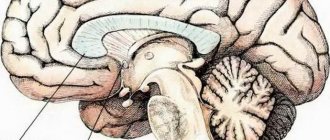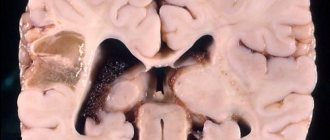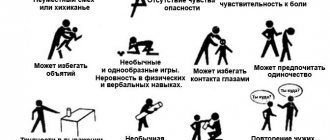A wide variety of psychiatric illnesses can manifest in childhood and adolescence. Their symptoms, although they have the most important signs that allow diagnosing the disorder, are still significantly different from the picture that is observed in adults.
In addition, there are conditions that are specific to childhood or adolescence. As they grow older, they may disappear altogether. But this does not mean that the emergence of childhood mental disorders can be ignored.
Types of disorders found in children
Most often, children at an early age are diagnosed with delayed psycho-speech development. Such disorders can take various forms; very often they develop in the absence of significant motor dysfunction. The child rolls over onto his back for the first time, sits up and walks as expected.
Delayed speech development can be diagnosed at the age of about 2.5 – 3 years. This disorder in rare cases is an independent diagnosis; most often its presence is only a symptom of more serious mental disorders.
There is now a sharp increase in the detection of autism in children. Classic signs of this disorder are:
- excessive isolation;
- constant desire to be alone;
- reluctance to build communication with other people;
- disturbances in speech development, with a tendency to repeat phrases, erroneous use of pronouns, monotonous and repeated repetition of the same words;
- mannerism and stereotypy;
- deliberately inflicting pain on oneself. Children bite themselves, pinch themselves, pull out hair, etc.
At the same time, sick children have excellent memory and a desire for order. But recently, autism in its pure form is rare. This disorder is accompanied by severe developmental delays, mental retardation and behavioral disorders with a tendency towards heteroaggression.
The most common mental disorders in children also include hyperactivity, attention deficit disorder and other behavioral disorders. In some cases, such disorders are compensated with maturity, but, more often than not, ignoring the problem in early childhood leads to more severe forms of the disease in adolescence.
With timely contact with a psychotherapist, these types of mental disorders can be successfully corrected. For example, the popular singer and actor Justin Timberlake suffered from attention deficit disorder as a child. The parents took the boy to a specialist, and he helped solve the problem. Now, although Justin is still not always able to concentrate on performing monotonous operations, nevertheless, he has become a successful, popular person, and an excellent family man.
Mental retardation is most often diagnosed in childhood. As a rule, this diagnosis can be identified only after the child reaches 3 years of age. Retardation can have different forms; with a mild or moderate degree of this disorder, it is possible to achieve social adaptation of patients. In severe forms of mental retardation, patients need constant care and control from loved ones throughout their lives.
In some cases, children may have trouble developing one skill. For example, reading, counting, writing or movement functions. This type of disorder should not be confused with mental retardation, which is characterized by a uniform lag in all indicators. To eliminate these violations, pedagogical methods are used to smooth out the existing lag. With timely correction of such disorders, it is possible to significantly improve the patient’s condition as he grows older.
Some mental disorders in childhood/adolescence are difficult to diagnose and are often confused with an adolescent crisis. This is schizophrenia, as well as other disorders similar to it. In such conditions, there is a disturbance in thought processes and a gross change in personality characteristics. If such disorders are not identified at an early stage and timely treatment is not started, their course worsens in adulthood.
Autism
This is a complex and poorly understood disease, which is quite rare in practice. Its cunning lies in the fact that it is not always possible to immediately notice signs of defeat. Moreover, sometimes parents and doctors attribute characteristic manifestations to characteristics of age. The key symptom of the disease is the inability to build relationships with other people, a tendency to loneliness, and the inability to share one’s own feelings and emotions.
Such children have difficulty breaking up with old habits and do not want to bring something new into their lives (for example, change their daily routine). Sometimes even a banal haircut at a hairdresser or rearranging furniture in an apartment traumatizes their psyche. Therefore, a sick child strives to constantly maintain the same environment. Due to the lack of communication skills, problems with speech function may develop.
Autism is a disease whose nature is not fully understood, so determining the true cause of its manifestation is problematic. Most scientists suggest that the problem is related to a disorder in the development of the central nervous system.
The manifestation of early childhood autism can be corrected, but for this it is necessary to contact experienced specialists (speech therapists, psychiatrists, pediatricians) who can easily establish contact with the baby, and classes are conducted in various areas - psyche, behavior, speech development.
Reasons for development
Scientists have put forward a large number of hypotheses regarding the causative factors in the development of this disease, their total number is 30. All of them contribute to the progression of the disease, but none of them can act as an independent cause.
We suggest that you familiarize yourself with: Cough, runny nose without fever in a 2-year-old child, treatment
It is known that most often the manifestation of symptoms occurs in connection with a congenital pathology based on a deficiency of the central nervous system. It is formed due to genetic predisposition, abnormalities of chromosomal composition, disorders of nervous function in the case of pathological pregnancy or complicated childbirth.
Mental disorders characteristic of adolescence
During adolescence, conditions are observed that are either a continuation of childhood disorders or the initial stage of adult diseases. At this time, the body undergoes numerous changes, including hormonal ones, which lead to the appearance of specific behavioral problems. The most common mental disorders in adolescence are:
1. Anorexia nervosa. This form of eating disorder most often occurs during puberty. Girls are most susceptible to this disease. The sex ratio is 10:1, favoring females. The cause of this disorder is an intense fear of the appearance of excess weight, and the desire to conform to the stereotypes of beauty accepted in society. Heredity has little effect on the appearance of this type of disorder. A prime example of this is one of the Olsen sisters. Mary-Kate, unlike her sister, suffered from anorexia.
2. Bulimia nervosa. This type of disorder is also more common in girls. This disorder is characterized by bouts of binge eating, followed by forced removal of what has been eaten. Unlike anorexia, the cause of this disorder is a psychological dependence on eating food in unlimited quantities.
3. Depression. The most common form of mental disorder in adolescents. Any stress can lead to depression. Many famous actors, athletes and politicians admitted in candid interviews that they suffered from depression in adolescence. Jean-Claude Van Damme managed to overcome prolonged teenage depression thanks to the help of specialists and intensive sports training. Parents should not underestimate the danger of such disorders. Prolonged depression can lead to serious consequences, including suicide attempts.
4. Anxiety disorders can be caused by stress experienced in early childhood. Panic attacks can be caused by a variety of reasons. By recognizing the problem and contacting specialists, it is possible to solve this problem. The patient learns to fight his fears rather than hide from them.
The behavior of a teenager cannot always be explained by mental disorders. In some cases, behavioral disorders are associated with pedagogical neglect and the social conditions in which the child lived.
Constant manifestations of anxiety
Every child's childhood should be as carefree as possible. Therefore, any manifestations of anxious behavior, especially those without cause, should be a signal to parents.
How can you tell if something is wrong with your child? Any change in behavior will be evidence of this. For example, let’s imagine that your student used to treat certain situations normally, but now he has started to worry a lot about them. An upcoming test, a fear of being late for school, a tantrum over not being able to do their homework perfectly - all this indicates that your child is starting to have problems.
Two "flower" homes in West Seattle act as an oasis in the cityscape
A woman has been decorating her home for 30 years: this has affected both the interior and the price
Crawling climber. The man showed which guest crawled into his room on the 4th floor
Diagnosis and treatment of mental disorders in children and adolescents
Diagnosis of any mental disorders should be carried out by a psychiatrist or psychotherapist. Recently, hyperactivity syndrome is increasingly being diagnosed by pediatricians who do not have the appropriate knowledge and skills. If a child has signs of one or more types of psychological disorders, then it is necessary to immediately contact a specialist. Only an experienced psychiatrist will be able to distinguish errors in the educational process from mental disorders, and, if necessary, prescribe medication.
As mentioned above, some types of mental disorders in childhood/adolescence can spontaneously correct over time. But most of them only get worse without proper treatment and correction. Specialists of the Psychoendocrinology Center have the opportunity to:
- conduct research to identify psychological disorders in children and adolescents;
- diagnose the disease, determine its form and assess its severity;
- prescribe psychotherapeutic and drug treatment.
Many parents are deterred from seeing a doctor by fear of publicity. No one wants their child to live with the label of “psycho.” The staff of our Center guarantees each patient complete confidentiality and an individual approach.
In their work, the Center’s specialists actively use the latest techniques and developments. Psychotherapeutic and rehabilitation measures are carried out in full. Drug treatment is prescribed to children only in cases where it is really necessary. In this case, the small patient takes one single medicine; experts call this approach to treatment monotherapy.
How to make up for the lack of communication with peers
You can try to renew your child’s communication with peers. Now it is possible to meet in small groups, you can organize walks, meetings at home, where children can organize free play together. If there is a danger of infection, you can arrange a game with peers in the virtual space. It's better than nothing.
According to my observations during quarantine, children learned to play with each other via virtual communication: for example, playing “mothers and daughters” via video communication. This speaks of the creative potential of the child's psyche. It's a good alternative, but it won't replace live, physical play.
Lack of interest in active games
Every child needs regular physical activity. And most kids are happy to run, kick a ball or jump on a trampoline. Only by the age of 5-6 years do they learn to concentrate on one task and can sit quietly for some time.
How can you help a teenager after breaking up with a loved one?
If you notice that your baby is overly calm and plays for a long time alone with the chosen toy, this may be one of the symptoms of autism. Such children avoid eye contact, react poorly to changes in environment and do not like to switch to another activity.












